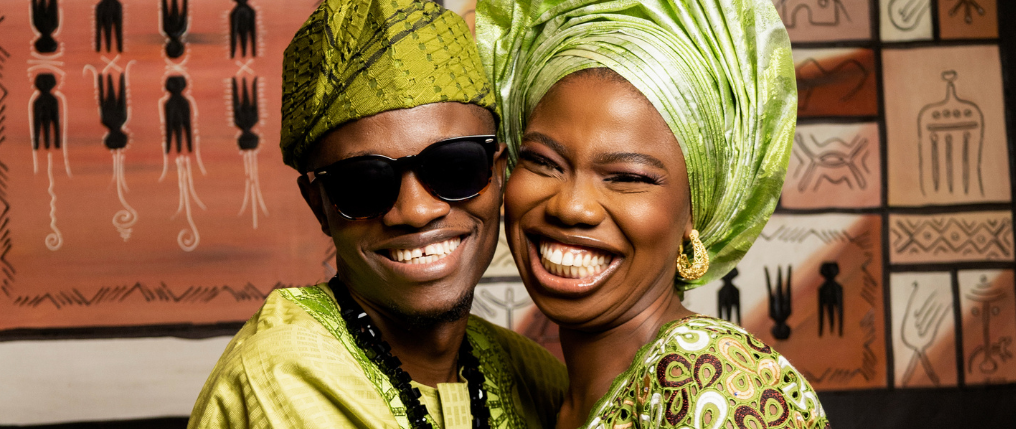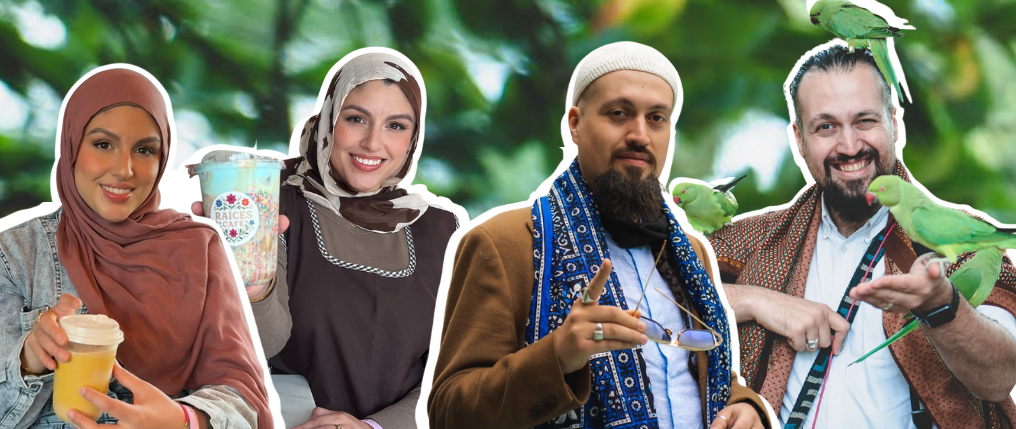
Exploring Walima: A detailed overview and guide
November 14, 2023
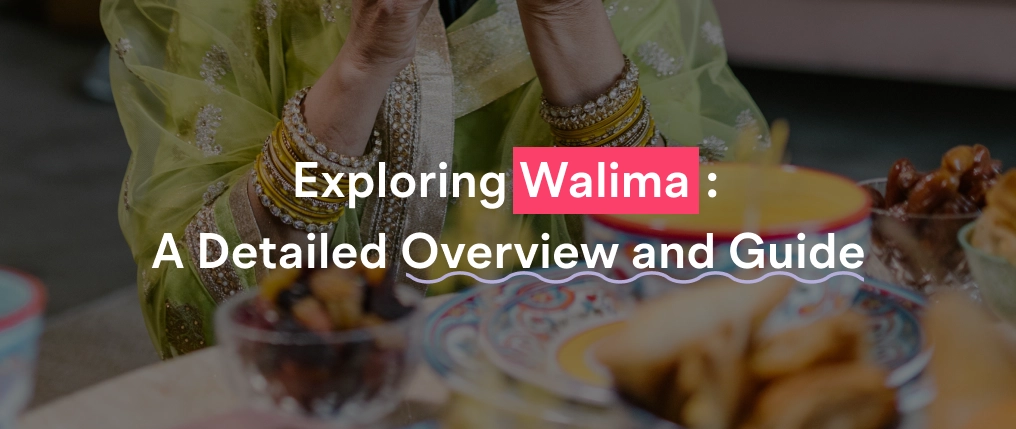
In the rich tapestry of our Islamic traditions, one vibrant thread stands out – the Walima. It’s not just a feast; it’s a symbol of joy, unity, and the start of an incredible journey for a couple.


Looking for your soulmate?
You won’t find your soulmate on this blog post but you might find them on Muzz - the world’s biggest Muslim dating and marriage app.
The Walima marks the completion of the official marriage contract, and it holds immense significance in our Islamic culture. But what exactly is this Walima, and why do we celebrate it with such enthusiasm and reverence?
In this blog post, we warmly invite you to dive headfirst into the world of the Walima. Let’s unpack its meaning, purpose, customs, and why it holds such a special place in our hearts.
Whether you’re planning your own Walima, curious about Islamic traditions, or simply eager to explore diverse cultural celebrations, read this post. Dive into the world of the Walima, an Islamic tradition symbolizing joy and unity. Learn its significance and cultural importance in this detailed guide.
Table of contents:
What is the significance of Walima?
Can Nikah and Walima be on the same day?
When can Walima be celebrated?
Who’s responsible for hosting the Walima?
What is Walima?

Walima is a term you’ll often hear in Islamic culture, especially when it comes to weddings. It’s essentially the second part of a traditional Islamic wedding ceremony, with the first part being the Nikah, the formal marriage contract.
Related content: What is nikkah?
Now, here’s the deal: Walima is all about celebrating the marriage and the happiness that comes with it. It’s a big, joyful feast or party usually after the Nikah.
One exciting thing about Walima is that it’s not just limited to weddings. While it’s often used in the context of marriage, the word “Walima” essentially means to gather or assemble for a celebration.
Related content: The complete guide to a Muslim wedding
So, it can be used for other significant life events like celebrating the birth of a baby or even when someone buys a new home.
Valima or Walima?

Both “Valima” and “Walima” are commonly used terms to refer to the celebratory feast in Islamic weddings. The choice of spelling often depends on regional and cultural variations.
– “Walima” is the more widely recognized term and is commonly used in Arabic and other regions.
– “Valima” is a variation of the term and is sometimes used in South Asian cultures and communities.
Related content: What happens at an Arabic wedding
Both words essentially refer to the same celebration that follows the Nikah and marks the official beginning of the married life of a couple. The choice of spelling is a matter of cultural preference, and both are considered correct.
What is the significance of Walima?
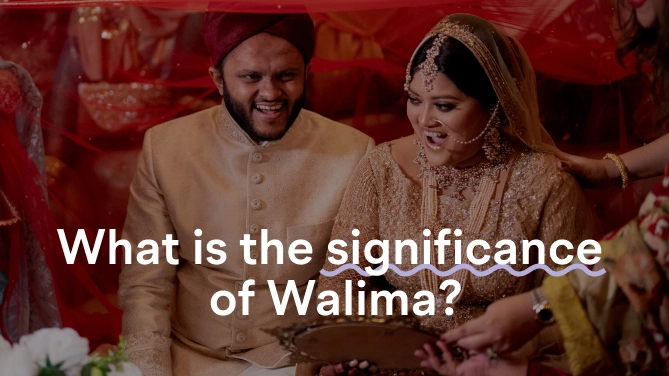
Let’s talk about why Walima is so important for us in Islamic culture:
1. Gratitude to Allah: First and foremost, Walima is a way for the newlyweds to show their gratitude to Allah for bringing them together in marriage. It’s a moment to say thanks for this beautiful journey and for all the blessings that come with it.
2. Completing the Marriage: In our Islamic tradition, a marriage isn’t considered complete until we’ve had our Walima. It’s like the official announcement and celebration of our union, marking the start of our new life together.
Related content: Tunisian wedding: 7 days and nights of beautiful traditions
3. Strengthening Ties: Walima is all about bringing our families, friends, and the community together. It’s a chance for everyone to share in our joy and strengthen the bonds that tie us all together.
4. Following the Prophet’s Way: You know, Walima is something we do because it’s part of the Sunnah, the teachings of our beloved Prophet Muhammad (peace be upon him). By following this tradition, we’re honouring his way of life.
5. Celebrating Joy and Love: The Walima isn’t just any gathering; it’s a joyful celebration filled with love and happiness. It adds an extra layer of joy to our wedding festivities.
Related content: 7 traditions to know before attending a Lebanese wedding
6. Blessings for Our Home: The Walima isn’t just a party; it’s a symbol of the happiness and prosperity we hope to have in our new life together. It’s a way to ask for blessings for a harmonious and joyful married life.
Can Nikah and Walima be on the same day?

Yes, absolutely! It’s totally common in Islamic weddings to have Nikah and Walima on the same day. It actually makes things a lot simpler. You see, you formalize your marriage with the Nikah ceremony, and right after that, you dive straight into the joyous Walima celebration, all in a single day.
Related content: Everything you need to know about Nikkah
This can be super convenient, especially if you’re into keeping things straightforward. But hey, no one-size-fits-all here. Some couples might opt to spread them out over different days, and that’s perfectly fine too. It all boils down to what feels right for you and your families. So, whether it’s a one-day bash or a two-day affair, it’s your call! Read below what other days you can organise the Walima.
When can Walima be celebrated?

As we mentioned above, Walima is typically celebrated after the Nikah. While there can be some variations and debates on the exact timing, here’s a general guideline:
Same Day as Nikah
Yes, some couples go for it! They have the Nikah ceremony and then jump right into the Walima on the very same day. It’s like an all-in-one celebration, keeping things simple and efficient.
Related content: What to expect at an African wedding as a first-time guest
Within Two Days
Now, this is the one many folks follow. It’s generally recommended to have the Walima within two days after the Nikah. This timeframe is kind of the sweet spot for many.
Before Consummation
Some prefer to have the Walima after the Nikah but before the marriage is, you know, physically consummated. It’s a way to celebrate before the more private aspects of married life begin.
Related content: 6 Egyptian wedding traditions worth knowing about
During the Wedding Procession
In certain cultures, the Walima gets wrapped into the whole wedding procession. This means it’s part of the grand wedding events, often with lots of family and friends in attendance.
How is Walima performed?
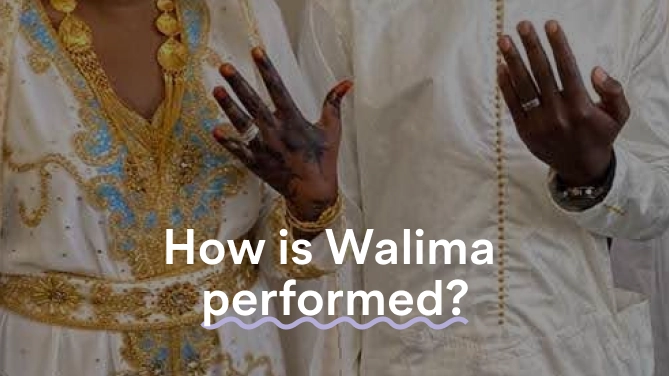
The performance of the Walima involves several key steps and customs:
1. Planning and Invitations: The groom is primarily responsible for planning and hosting the Walima. He decides on the date, venue, and guest list. Invitations are sent to both sides of the family, close friends, and neighbours. It’s essential to invite a diverse group of people to foster unity and community spirit.
2. Venue Selection: The Walima can be hosted at various venues, such as the groom’s or bride’s family home, a banquet hall, a community centre or a mosque. The choice of venue often depends on the preferences and resources of the families involved.
Related content: How to prepare a Moroccan wedding
3. Menu Preparation: Food plays a central role in the Walima celebration. A lavish feast is prepared, featuring a variety of dishes, including traditional and regional specialities. The menu often reflects the cultural background of the couple and their families.
4. Bride and Groom Attire: The bride and groom typically wear special wedding attire. It is customary for the bride to change into a different outfit for the Walima, often a dress that complements her wedding gown.
5. Guest Arrival: Guests arrive at the venue and are typically welcomed with warmth and hospitality. It is encouraged in Islam that all invited guests should accept the invitation, and refusing without a valid excuse is considered sinful.
Related content: Algerian wedding: 8 traditions you don’t want to miss
6. Feasting and Celebration: During the Walima, guests gather to enjoy the feast and celebrate the newlywed couple’s union. There may be speeches, music, and dancing, depending on cultural and regional traditions. Guests have the option to eat or not, but they are expected to attend the ritual.
7. Avoiding Extravagance: While the Walima is a joyful celebration, it is generally advised to keep it simple and avoid excessive extravagance. Over-the-top displays and unnecessary expenses are discouraged, as the focus should be on the celebration of the marriage itself.
8. Respecting Customs: Certain customs should be observed during the Walima, such as refraining from displaying the bride on stage, not inviting guests from far distances, and not demanding or expecting gifts for the groom from the bride’s guests.
Related content: Attending a Henna Party as a Guest? Here’s Your Essential Guide
9. Prayers and Blessings: It is common to offer prayers and blessings for the newlyweds during the Walima, asking for happiness and prosperity in their married life.
Who’s responsible for hosting the Walima?
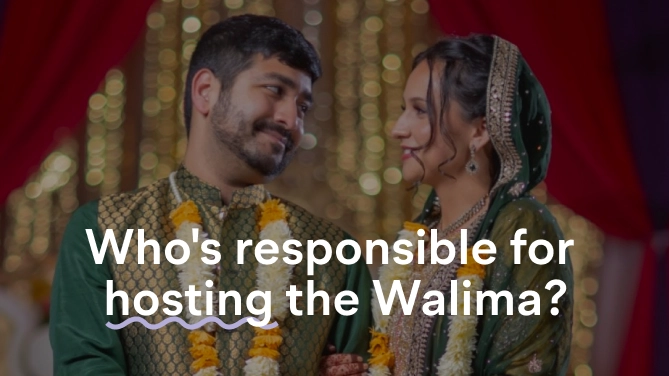
Traditionally, the groom is also expected to cover the expenses associated with the Walima, including the cost of the venue, food, and any other arrangements. This financial responsibility is seen as a gesture of generosity and commitment.
Related content: Mahr in Islam – A Guide for Muslims
It’s important to note that while the groom and his family typically take on the primary responsibility for the Walima, families may adapt these customs based on their cultural and regional traditions.
In some cases, both the bride’s and groom’s families may collaborate to organize and fund the celebration. The key is to ensure that the Walima is a joyful and memorable occasion for all involved.
Conclusion
In conclusion, the Walima is more than just a ceremony or a feast; it’s a testament to the depth of Islamic culture and the richness of our traditions. It signifies the beginning of a new chapter in the lives of couples, a moment of profound gratitude to Allah, and a beautiful expression of unity within our communities.
As we celebrate the Walima, we not only honor our faith but also the bonds of love and togetherness that make our lives richer and more meaningful.
